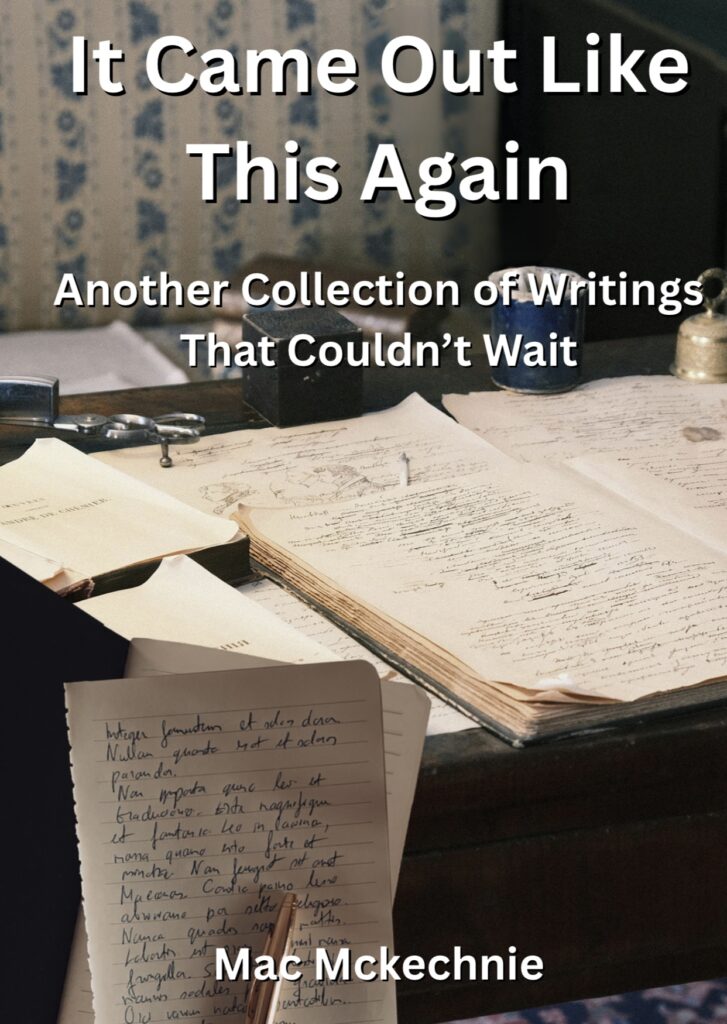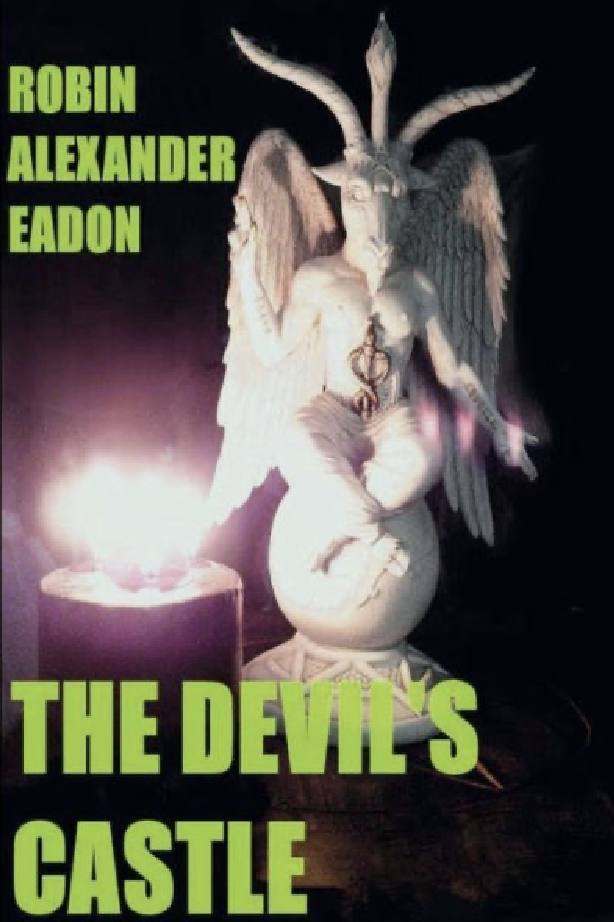
By Mac Mckechnie
(From the book “It Came Out Like This Again” available on Amazon)
Maggie Webb had lived in the cottage on Barley Lane for just three months, and already it had begun to settle around her like a well-worn cardigan. The beams creaked when it rained, the kettle took its time to boil, and the front gate stuck unless you gave it a firm nudge with your hip. She liked it that way — a little temperamental, a little too quiet. Like her.
She’d downsized from the family home after Colin passed — the garden had become too wild, the stairs too steep, the silence too sharp. The cottage, though smaller, had a softness to it. The sort of place you could breathe in.
It was while cleaning out the built-in cupboard under the stairs — the one with a door that stuck — that she found the box. An old shoebox, tucked neatly at the back, bound with fraying string. She expected old bills, or takeaway menus, or perhaps some forgotten tools. But inside were postcards.
Dozens of them.
They weren’t addressed to her — of course not. The postmarks ranged from the 1960s to the early 2000s, all sent to one “Miss T. Brightwell, Barley Cottage, Barley Lane.” Maggie ran her finger across the curling edges, surprised at how bright the images still were. Sun-drenched beaches, foggy highlands, a market square in Bruges, a donkey in Scarborough wearing a straw hat.
Some were written in looping cursive, others in hasty block letters. Each carried a quick message — “Weather’s holding,” “Fish and chips to die for,” “Stan fell in the lake again.” All cheerful, all brief. Maggie sat cross-legged on the floor and began to read them one by one, a smile forming with each new sender.
She’d planned to do a bit of hoovering, maybe wash the kitchen tiles. But the afternoon faded into early evening with the postcards spread like a paper quilt across the rug. It was like opening windows into someone else’s seasons.
That night, unable to sleep, Maggie fetched the box again and laid them out on the table by date. She cleared the top shelf of the kitchen dresser and began propping the best ones along it like little travel trophies.
By the end of the week, she had them grouped by destination. Spain next to Skegness. Paris beside Padstow. A life she hadn’t lived, but could now admire with her tea.
And then, she found the one that didn’t fit.
No picture. Just a blank, buff-coloured card. One line, written in thick black ink:
“It’s time to tell her the truth.”
It was unsigned.
Maggie stared at the card until her tea went cold.
She flipped it over, hoping for a name, an address, anything — but there was nothing. No stamp, no postmark. Had it even been posted? Or just placed there? She tried to shake the chill that crept over her shoulders.
Curiosity, of course, soon outweighed discomfort.
The next morning, she walked into the village library, clutching the card and a sample of the old postcards in a padded envelope. Mrs Latimer, the librarian, squinted at the handwriting through her thick glasses.
“These are lovely,” she murmured. “You say they belonged to a Miss Brightwell?”
Maggie nodded. “Lived in the cottage before me. Do you remember her?”
“Oh, yes. Tabitha Brightwell. She was a fixture, dear — part of the furniture, you might say. Never married, never moved. Died around 2007, I think. Lovely woman. Used to host garden teas for the Guides.”
Maggie smiled politely. “Do you know if she had family?”
Mrs Latimer’s brow furrowed. “I don’t think so. Though there was some talk of a child, years back. Whispered more than spoken. Not the sort of thing that made the parish magazine, if you catch my drift.”
Maggie did.
Later, back at the cottage, she made a list: find local archives, look through electoral rolls, and — perhaps most sensibly — speak to George from the Post Office. He knew more about village history than any book.
When she showed him the card, George raised his eyebrows.
“Blimey,” he muttered. “That’s her writing, alright. Tabby wrote like she was in a hurry to say something important.”
“So she wrote it?” Maggie asked.
“Looks like it.” He studied the card. “That’s not a postcard, though. That’s a message. Probably never sent.”
“But meant for someone,” Maggie said, softly.
George nodded. “Aye. Maybe even meant for you.”
That night, Maggie moved a chair under the postcard shelf and stared at them all. Colourful, chatty fragments of a life long gone. But one thing now stood out: over time, the senders changed. Names stopped repeating. Some disappeared altogether.
And then she noticed it — in three cards, spread over two decades, the same handwriting had signed off simply: Love always, L.
Someone who never gave a full name. Someone who kept writing, long after most had stopped.
She pulled those three cards down and laid them beside the buff one. Her heart gave a little jolt.
The handwriting matched.
On Saturday, Maggie walked down to the monthly market in the church hall, carrying a small folder of postcards and the buff-coloured message tucked inside. She hadn’t slept much — her mind looping over the cards, the handwriting, the strange sense that she’d been left a mystery to solve.
She didn’t know exactly what she was hoping for. Clarity? A coincidence? Closure?
What she found was a table at the far end, manned by a tall woman in her sixties with soft grey curls and eyes that crinkled when she smiled. The sign behind her read: “Local History and Family Tracing – Ask Lorna!”
Maggie hovered. “Excuse me… are you Lorna?”
“I am,” the woman said warmly. “How can I help?”
Maggie laid the buff card on the table.
Lorna’s face changed. Not with shock — but with something gentler. Recognition. She reached out, tracing the writing with one finger.
“I wrote this,” she said simply.
“You…?”
“I’m Tabitha’s daughter,” Lorna said, folding her hands. “She had me when she was very young — a secret too big for that time. I was raised by a relative in Leeds. But we stayed in touch, quietly. Every birthday, every holiday, a postcard. She never signed with her full name. Just ‘L.’”
Maggie stared, heart thudding. “And this card?”
“It was hers, really,” Lorna said. “She meant to send it to me years ago. To finally tell me the whole story — why she gave me up, how she loved me the whole time. But she never did. I found it among her things after she passed. I didn’t know what to do with it. I suppose I left it behind when the cottage was cleared. Maybe I hoped someone would find it… and ask.”
Maggie reached across the table. “I’m very glad I did.”
They shared tea in the little café that backed onto the market. Lorna told her stories about Tabitha — the tea parties, the garden, the way she hummed when she cooked. Maggie, in turn, spoke of the postcards, the shelf, and how the cottage had begun to feel like it had been waiting for her to arrive.
By the time the scones were gone and the mugs were empty, something warm had stitched itself between them — a quiet understanding, a shared fondness for a woman neither of them had fully known until now.
“Come round sometime,” Maggie said, as they parted. “See the postcards. They’re still watching the room.”
“I’d like that,” Lorna smiled. “And maybe… maybe I’ll bring a new one.”
That evening, Maggie lit a candle and stood before the shelf.
She added one last card.
A hand-drawn heart, and three words in firm, clear ink:
“Welcome home, L.”
Click here to buy this book from Amazon
Author Bio:
“It Came Out Like This” – Again
Stories, Poems, and Echoes of the Heart
Step once more into a world where everyday lives shimmer with quiet courage, longing, and unexpected grace.
From tender reconnections over café tables to lonely watchtowers on windswept cliffs, from wartime courage in the dust of Afghanistan to memories sold, edited, or broken apart in future worlds—this rich new collection draws from the same well as It Came Out Like This, but dives deeper.
Eighteen original short stories— of which “The Postcard Shelf” is just one, – some uplifting, others unsettling—are threaded together with poetic bridges that hum with nostalgia, heartbreak, and hope. Together they form a tapestry of lives lived and nearly lost, of loves remembered, choices made, and the mysterious spaces that sit between silence and sound.
Whether it’s a gardener whispering to the soil, a soldier whispering goodbye, or an experiment whispering far more than it should—every voice here matters.
And somehow, again… it came out like this.
Contact Author:
Email: mckechnie31@btinternet.com





